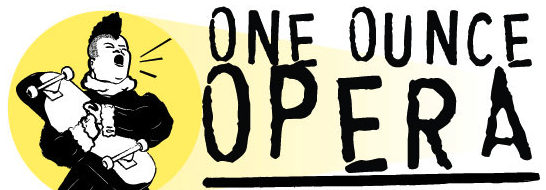One Ounce Opera is thrilled to present the Regional Premiere of award-winning composer Robert Paterson and award-winning librettist Mark Campbell‘s The Whole Truth: A Chamber Opera in Seven Scenes, based on a story by Stephen McCauley, as part of the 4th Annual Fresh Squeezed Ounce of Opera. It is an honor to produce their work! Singers Elise Leung Kotara (Megan A), Allyssa Kemp (Megan B), and Jake Jacobsen (The Man) had these questions for the creators, answered here by Composer Robert Paterson (with a nod of approval from Mark). 🙂
What are the challenges of composing one role for two voices, and writing comedy?
For me, when composing music with more than multiple vocal parts—operas, for example—the challenge, and I would even say the goal, is to make sure to utilize voice types that compliment each other. In The Whole Truth, Mark’s libretto calls for two female singers, Megan A and Megan B, who represent the “bifurcated soul” of a young married woman. Megan A represents her her outer self (at least the way I viewed her), and Megan B, her inner voice, so to speak. I cast Megan A as a soprano, and Megan B as a mezzo-soprano, primarily because Megan A’s personality seemed brighter, so I associated her brighter personality with a

brighter voice-type. Megan B is a bit more sarcastic, with a somewhat darker, biting sense of humor, so to me, for variety, and because it seemed to work well in a timbral sense, I thought it would be effective to have her role performed by a mezzo-soprano. I could have cast them both as the same voice type, but even for a short opera, it’s nice to have a little more sonic variety via different voices, if only to give the ear a break once in a while by alternating from one voice type to another. Also, since there are moments when they sing together as one, two different voice types make it a little easier to distinguish the voices when they are singing intervals, and that was an important factor to consider.
Regarding composing a comic opera, or at least, one that contains elements of humor, the main challenge is to get out of the librettist’s way, or at least to work with and not against the librettist! Having a sense of comedic timing is critical. It’s incredibly easy to ruin a joke if you’re not careful, but far more difficult to make sure it lands correctly. Often times, critics will comment that sections of comic operas sound too conversational, or have too many recitative sections that don’t flow or whatever, but it’s usually extremely difficult to make humorous moments work if you compose through them and not with them. Mark’s libretti are always so economically-written and so incredibly clear, in the best possible way, so it’s obvious when there are humorous moments. He is masterful at getting out of the way of the composer, which is great, but then the pressure is on even more to “bring it” and make sure his words are humorous when they need to be, with the music! Mark always gives plenty of room for that, which is fantastic.
What elements of Stephen McCauley’s story inspired you to turn it into an opera?
Mark introduced Stephen’s story to me, and I fell in love with it right away. Initially I was a little hesitant, since I had already written an opera entitled Three Way, three one-act operas about a woman and her android lover, a dominatrix and her client, and a swinger party, respectively, and I didn’t want to become known as “the sex composer”! Or at least, the composer who already writes about people and their complicated sex lives! However, it is a great story, and who would ever turn down an opportunity to do anything with Mark, especially a story like this? It was a win-win all around.
What lead you to change certain things in the original story for the opera, specifically how you created the scene with the carpenter?
Interestingly, Mark had initially written the libretto with less text for the male voice, and no aria or song. I suggested that we include at least one song, and we decided that it might be fun to have him sing a sort of country ballad, or at least, with the simple elegance of Mark’s text, that’s how I set it. It’s a fairly light setting, but then again, he’s a fairly light character!

We’re curious about the decision to write two characters for Megan, the woman, and one for all the male characters. Tell us about it!
This was Mark’s idea from the beginning, and I was totally game. I think having one baritone sing all of the male parts gives a fantastic vehicle for that singer. There are a lot of characters, and they are all quite different, so it’s a lot of fun. Also, and perhaps this is the elephant in the room, having only three singers makes this opera very approachable from a logistical and financial perspective. Since the male roles are so small, yet so varied, it seemed to make sense to use one singer for all of them. Also, since the male characters never appear together, yet the female (Megan A and B) are always together, it made sense to use two singers for Megan, and one for all of the male characters.
What message do you hope for the audience to receive, if any?
Personally, I just hope that the audience (and musicians!) have fun with it. Although there are definitely reflective and even serious moments throughout the opera, especially at the end, what’s beautiful about both Stephen’s story and Mark’s libretto is how much it represents the human condition. We’ve all experienced the stress of trying to keep it all together, the occasional monotony of relationships, and wanting something more out of life. In this case, we experience it through the lens of a woman who seems to want it all, at least as far as relationships are concerned, yet she can’t keep it all together. I hope audience members leave thinking that this is what contemporary opera can be, and what makes it so wonderful: the possibility of experiencing something fresh—Fresh Squeezed!—and potentially about characters and stories that are of our time, characters and stories we can relate to. Ultimately, I hope your audiences fall in love with our opera and leave wanting more!
***
Robert Paterson has won awards for his music in virtually every classical genre, and he has been called a “modern day master” (AXS), and “the highlight of the program” (The New York Times). Gramophone recently noted that Paterson “could probably set a telephone book to music and create something that captivates…” Named The Composer of The Year by the Classical Recording Foundation, his music is featured on over twenty albums and his works have been performed internationally by over one hundred ensembles, including the Minnesota Orchestra, American Composers Orchestra, Louisville Orchestra, Austin Symphony, Vermont Symphony, and the Albany Symphony, as well as Shreveport Opera and Opera Orlando, among others. This past season’s highlights included performances by the Buffalo Philharmonic Orchestra, Delaware Symphony, and the Atlantic Classical Orchestra, as well as the critically acclaimed Nashville Opera world premiere of Three Way and the New York premiere at BAM. Notable awards include the Copland Award, the Utah Arts Festival award, and a three-year Music Alive! grant from the League of American Orchestras and New Music USA. Paterson’s most recent award is the Alfred I. DuPont Composers Award from the Delaware Symphony, given to a distinguished American composer or conductor who has made a significant contribution to the field of contemporary classical music. Paterson’s works are published by Bill Holab Music. For more information, visit robertpaterson.com.
***
Mark Campbell’s work as a librettist is at the forefront of the current contemporary opera scene in this country. A prolific writer, Mark has produced 28 opera librettos, lyrics for 7 musicals, text for 5 song cycles and one oratorio and his works for the stage have been performed at more than 60 venues around the world. The composers with whom he collaborates represent a roster of the most eminent composers in classical music and include three Pulitzer Prize winners. Mark’s best-known work is Silent Night, which received the 2012 Pulitzer Prize in Music and was produced at Wexford in 2014.
Other successful operas include Elizabeth Cree, As One, The Shining, The (R)evolution of Steve Jobs, Later the Same Evening, The Manchurian Candidate, Volpone, Rappahannock County, Approaching Ali, Bastianello/Lucrezia, and The Nefarious, Immoral but Highly Profitable Enterprise of Mr. Burke & Mr. Hare. Awards include: a Grammy nomination, the first Kleban Award for Lyricist, two Richard Rodgers Awards, a Larson Foundation Award, and a NYFA Playwriting Fellowship. In addition to his writing, Mark mentors for the next generation of librettists through such organizations as American Opera Projects, American Lyric Theatre, and the American Opera Initiative. Upcoming premieres include: Stonewall for New York City Opera, Today It Rains for Opera Paralléle, Edward Tulane for Minnesota Opera and the book for the musical Les Girls at Théâtre Du Châtelet. www.markcampbellwords.com

